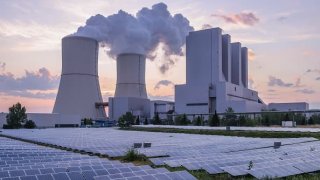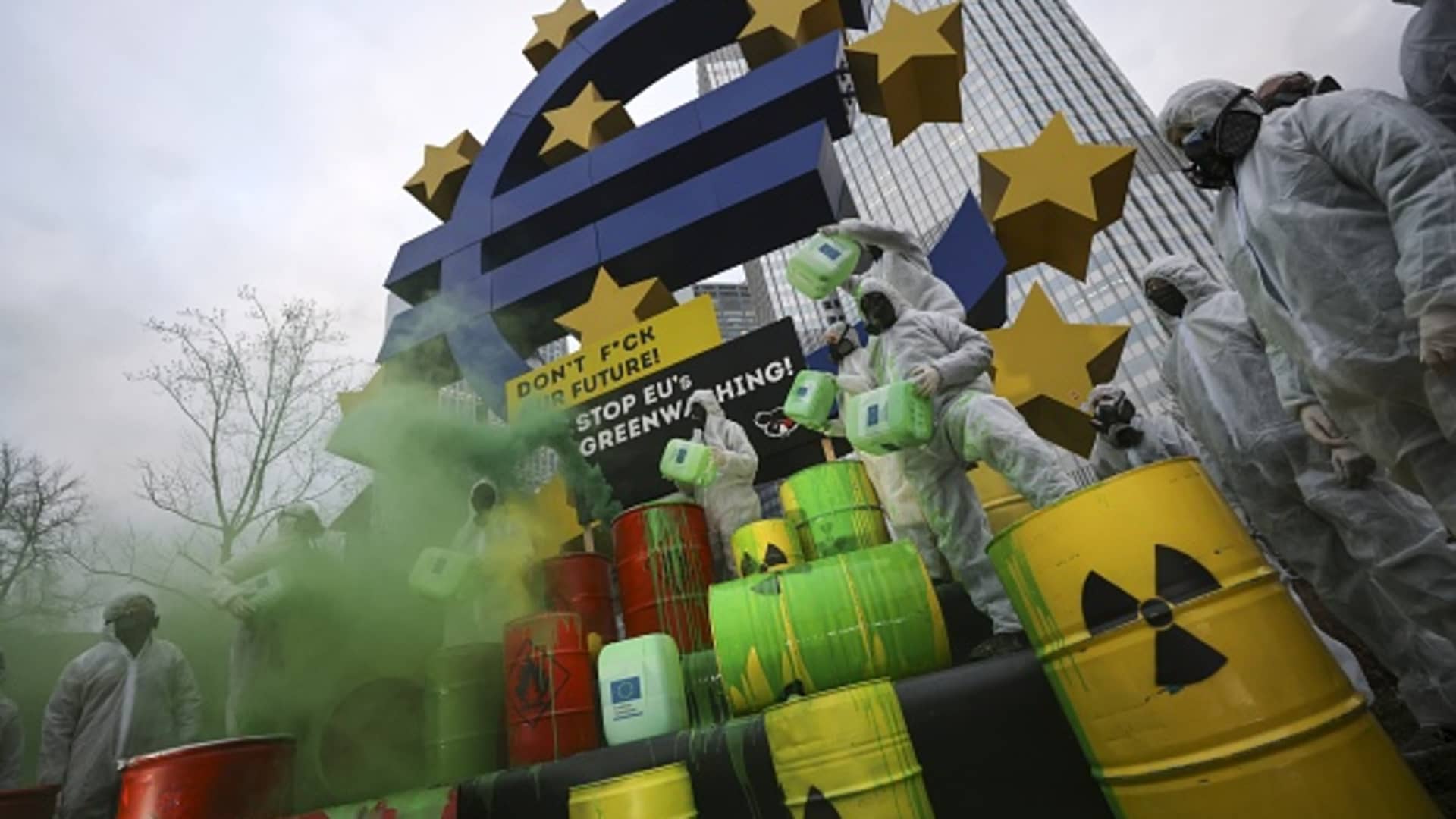
- The European Union voted to keep some specific uses of natural gas and nuclear energy in its taxonomy of sustainable sources of energy in some circumstances.
- There are time limits and specific emissions disclosure requirements for those sources.
- The EU still has a legal obligation to reduce greenhouse gas emissions by at least 55% at the end of decade and to become climate neutral in 2050.
The European Union voted on Wednesday to keep some specific uses of natural gas and nuclear energy in its taxonomy of sustainable sources of energy.
Europe's taxonomy is its classification system for defining "environmentally sustainable economic activities" for investors, policymakers and companies. This official opinion of the EU matters because it affects funding for projects as the region charts its path to address climate change. In theory, the taxonomy "aims to boost green investments and prevent 'greenwashing,'" according to the EU's parliament.
The vote on natural gas and nuclear energy follows one that was passed in February, which amounted to a referendum on what had been a particularly controversial piece of the ruling. Natural gas emits 58.5% as much carbon dioxide as coal, according to the U.S. Energy Information Association. Nuclear power does not generate any emissions, though it draws criticism surrounding the problem of storing radioactive waste.
Get Connecticut local news, weather forecasts and entertainment stories to your inbox. Sign up for NBC Connecticut newsletters.
While the region did vote to keep nuclear and natural gas in its green taxonomy, it did not give those sources of energy a free pass to be included in every situation.
Generally speaking, using natural gas to generate electricity or to heat or cool many homes at once will be considered sustainable, while other uses may be excluded. They will have to be below certain emissions thresholds, and are only approved to 2030 or 2035, depending on the specific situation.
New nuclear plants using the most advanced technologies and modifications to extend the life of existing plants may be approved to 2040 or 2045.

The EU is still required to reduce greenhouse gas emissions by at least 55% at the end of the decade and to become climate neutral in 2050, in accordance with European Climate Law. But Wednesday's vote shows that at the same time the EU wants to encourage private investment in natural gas and nuclear as the region makes the transition from fossil fuels, particularly coal, to clean energy.
Money Report
Mixed reactions
There was a flurry of opposition to the decision.
Some observers objected to the fact that continuing to use natural gas means an ongoing dependence on Russian energy.
"I'm in shock. Russia's war against Ukraine is a war paid for by climate-heating fossil fuels and the European Parliament just voted to boost billions of funding to fossil gas from Russia," Svitlana Krakovska, a Ukrainian scientist on the Intergovernmental Panel on Climate Change, said in a statement shared by the European Climate Foundation, a philanthropic advocacy initiative that fights climate change.
Others say the inclusion of natural gas in the taxonomy undermines its goal to prevent greenwashing.
"With gas in the Taxonomy, the European Union has missed its chance to set a gold standard for sustainable finance. Instead, it has set a dangerous precedent. Politics and vested interests have won over science," said Laurence Tubiana, CEO of the European Climate Foundation, in a statement.
"The EU Taxonomy now falls short of its own initial goal, which was to prevent greenwashing in the financial system. Investors, companies and consumers will now be looking elsewhere for the science-based clarity and credibility they need," Tubiana said.
But some observers were encouraged by the vote and see it as an indication that European governmental leaders are facing the tough reality that it will take time and many steps to transform energy infrastructure, according to David Blackmon, an energy-related public policy analyst and consultant based in Texas.
The vote "reflects a growing recognition that the ongoing 'energy transition' is going to be far more complex and difficult to achieve than the overarching, simplistic narratives," Blackmon told CNBC.
"The fact that a legislative body as environmentally focused as the European Parliament has been now recognizes the role that both natural gas and nuclear must play to ensure the continent's energy security and stability is a welcome shift in outlook that should serve as an example worth of emulation by the Biden administration."
And if using natural gas helps in the ultimate goal of eliminating coal, then that is a justifiable decision, some say.
"Our main and most urgent priority is to phase out coal, as soon as possible in Europe. To do so, gas can have a role as an 'activity useful for the transition' when replacing coal – and only when replacing coal — because we want to pursue decarbonization," wrote Pascal Canfin, the chair of parliament's environment committee, in a LinkedIn post in February after the initial vote.
"There is a coalition contract in Germany, parties have agreed to speed up the country's coal phase-out from 2038 to 2030. This implies building more renewables, obviously, but also more gas," Canfin wrote. "And this is exactly the specific case where gas can positively contribute to the energy transition: when it replaces coal in power generation. Even the German Greens are supporting this trajectory."






